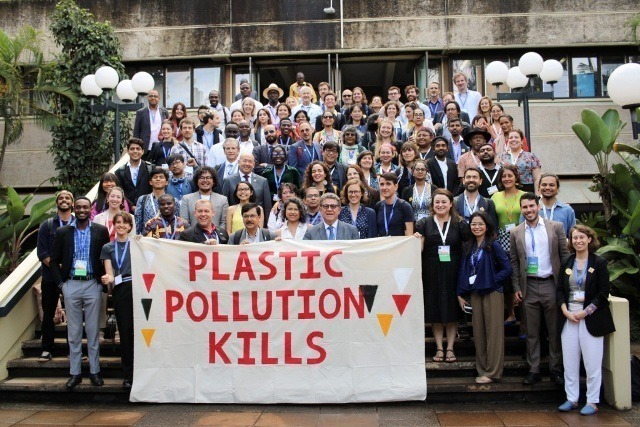The third meeting of the Intergovernmental Negotiating Committee (INC-3) concluded at the UNEP headquarters in Nairobi, revealing a concerning lack of progress towards a comprehensive global agreement to curb plastic pollution.
The meeting, which aimed to draft a treaty addressing plastic pollution from production to disposal, faced substantial challenges in reaching a consensus among Member States.
Despite a mandate for a revised draft, the INC-3 failed to achieve an agreement on priorities for intersessional work ahead of INC-4. This failure jeopardizes the significant advancements required for the treaty process and poses a threat to the ultimate goal of creating a comprehensive and legally binding agreement to combat plastic pollution, as mandated at the fifth United Nations Environment Assembly (UNEA 5.2).
The negotiations were marred by the influence of petrochemical interests, notably a group of ‘like-minded’ plastic-producing countries with low ambition and the reluctance of ‘high ambition’ countries to push for more significant strides. The lack of consensus prevented the establishment of key targets, baselines, and schedules for reducing plastic production. Moreover, the absence of robust reporting mechanisms to monitor compliance with global reduction targets is a significant setback.
While some Member States strongly advocated for addressing plastic production, hazardous chemicals, and safeguarding human rights and environmental health, their perspectives were overshadowed by the dominance of fossil fuel and plastic-producing countries.
The conclusion of INC-3 leaves only two more sessions to fulfill the ambitious goal of creating one of the most crucial environmental agreements in history by the end of 2024. However, with the current challenges, achieving this target seems increasingly formidable. The INCs must devise a conflict of interest policy and find effective ways to handle countries obstructing the negotiation process deliberately.
Reactions from Stakeholders:
Daniela Duran, Senior Legal Campaigner, Upstream Plastic Treaty, Center for International Environmental Law (USA & Switzerland):
Expressed concern over the lack of meaningful progress and emphasized the necessity of concrete and legally binding commitments to reduce primary plastics production, prioritize human and environmental health, and address communities affected by systemic pollution.
Jacob Kean-Hammerson, Oceans Campaigner, Environmental Investigation Agency (UK):
Highlighted the treacherous path ahead with limited time remaining and urged for a stronger focus on tackling overproduction and the world’s reliance on plastics. Emphasized the need for ambitious states to stand firm against attempts to weaken progress by major oil and petrochemical producers.
Swathi Seshadri, Director of Programs and Team Lead (Oil and Gas), Centre for Financial Accountability (India):
Expressed disappointment in member states unwilling to work towards a comprehensive treaty covering the entire lifecycle of plastics. Urged resistance against the impact of petrochemicals on communities and emphasized the need to regulate plastic production and phase out virgin plastics.
Ana Rocha, Director of Global Plastics Program, Global Alliance for Incineration Alternative (Tanzania):
Highlighted the failure of negotiations to fulfill the promise of advancing a strong, binding plastics treaty. Acknowledged the dominance of certain countries over an ambitious treaty despite the majority’s support, particularly from African Bloc and Global South nations.
Jo Banner, Co-Founder and Co-Director, Descendants Project (USA):
Shared personal experiences regarding the devastating impact of plastic production on vulnerable communities and stressed the need to confront the industry’s detrimental effects.
Taylen Reddy, #BreakFreeFromPlastic Youth Ambassador (South Africa):
Urged African youth to confront the plastics industry and emphasized the importance of holding polluters accountable while advocating for ambitious targets to reduce plastic production.
Larisa de Orbe, Colectiva Malditos Plasticos (Mexico):
Highlighted the impact of toxic plastic waste trade on Latin America, calling for measures to ban plastic waste exports and prohibit environmentally harmful practices like pyrolysis and false recycling solutions.
Indumathi, Asia delegation and an affiliate of the International Alliance of Waste Pickers (AIW), India:
Expressed contentment with waste pickers’ inclusion in the draft-making process and emphasized the importance of formal recognition, definition, and a Just Transition for waste pickers in the ongoing discussions.
The failure of INC-3 to make substantial headway underscores the urgent need for cohesive global action to combat plastic pollution. As stakeholders express disappointment, concerns, and hopes for progress, the road to INC-4 remains a critical juncture to address the challenges impeding the creation of a robust and impactful global treaty on plastic pollution.

